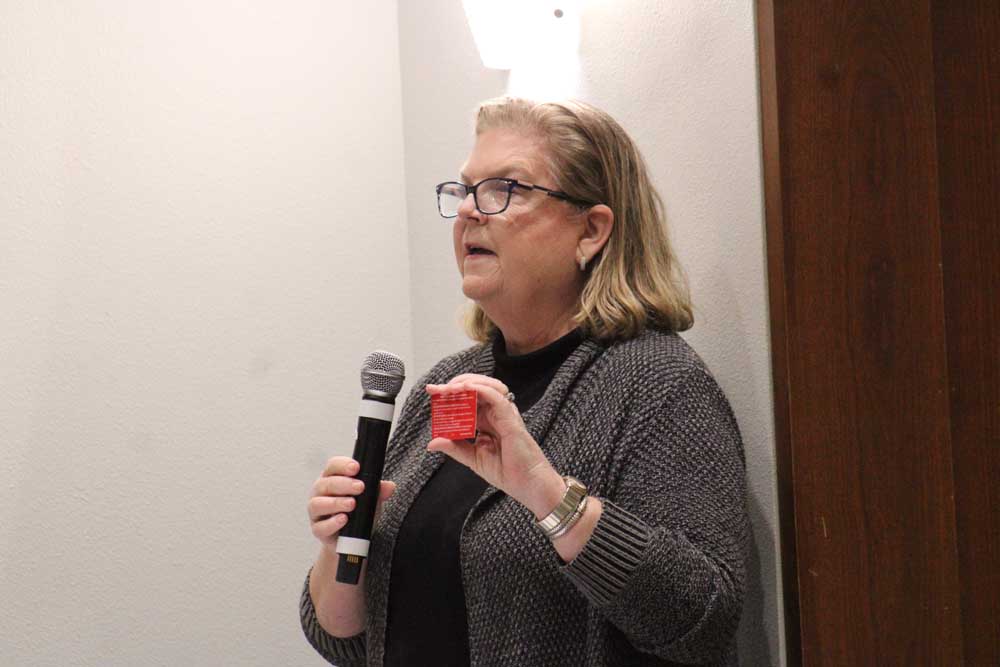UT Tyler Social Work Club, Monarca Initiative partner on ‘Know Your Rights Forum amid immigration crackdown
Published 5:40 am Tuesday, February 25, 2025

- Ginger Young, an immigration lawyer with Flowers Davis, holds up the Immigration Legal Resource Center's Know Your Rights card. (Jennifer Scott/Tyler Morning Telegraph)
East Texas organizations are pooling resources and coordinating efforts to equip residents with knowledge about their own rights. The desire to inform East Texans comes as immigration is more strictly enforced locally and across the country.
Attorneys, nonprofits and student-groups are among those banding together to educate residents. Last week, UT Tyler’s Social Work Club collaborated with the Monarca Initiative nonprofit to host a Know Your Rights Forum at the University Center’s Mabry Theatre.
Trending
“It’s important for documented and undocumented citizens and non-citizens to know their rights, their own rights and the rights of their neighbors and community members and friends,” said Ashton Riley, Vice President of the Social Work Club. “Things are constantly changing so it’s important to remain educated about your rights and the rights of your community members.”
Understanding Your Rights
Monarca Initiative co-founder and co-executive director Josefina Vazquez spoke of the organization’s objective and focus with the Hispanic community.
“We have citizens that we call ESOL – English Speaking of Other Languages,” she said. “We also provide assistance for… training, license, certification. We guide them on where and how to get information.”
Ginger Young, an immigration lawyer with Flowers Davis in Tyler, spoke to the attendees about what to expect and how to stay informed.
Young started her career representing governmental entities in civil rights cases.
Trending
“I went from representing law enforcement officers to the other side of the coin of representing undocumented immigrants,” she said. “So I’ve seen both sides of civil rights.”
According to Young, residents are not required to open the door for Immigration and Customs Enforcement (ICE) agents unless they have a valid search warrant signed by a judge — not a warrant signed by an ICE officer.
“If officers say they have a search warrant signed by a judge, ask them to slide it under the door,” Young advises. “Check it out because you know what? They’re probably not telling you the truth. Have them show it in a window. If you have a Ring camera, have them put it in front of the camera so you can see what’s going on.”
She also advised double-checking if the warrant has the correct name and address, as in some cases, the information may either be incorrect or out of date. Individuals may refuse to show any documentation that reveals what country they are from, but it is highly advised not to provide false documents or lie.
“The most important — and we all know this, but we don’t think to use it — we always have the right to remain silent,” Young said. “If you choose to remain silent, it’s very important that you vocalize it if at all possible.”
What to do if stopped or detained
If detained, individuals have the right to speak to a lawyer and receive calls from a lawyer. If an individual does not have a lawyer, they may request a list of pro-bono lawyers from the immigration officer. Individuals also have the right to contact the consulate, which may assist in locating a lawyer.
Young strongly recommends refusing to sign any and all paperwork until speaking with a lawyer.
“You’ve got to not only know what you’re signing but know the repercussions of what you’re signing,” she said. “They might present a piece of paper that says, ‘Hey, you wanna get out of jail, sign this piece of paper,’ and what you’re really signing is a voluntary departure.”
If ICE comes to a workplace, they must have a valid search warrant or the consent of the employer to enter non-public areas. The important thing is to remain calm and avoid drawing attention, Young said.
“Don’t panic and don’t run,” Young said. “If you’re frightened or feel like you need to leave, walk as calmly as you can to the nearest exit. Now, they may tell you to stop and if (so,) ask ‘Am I free to leave?’ If they say yes, then go ahead and keep walking. If they say no, you’ve gotta stop.”
The same rights apply if ICE approaches someone in public. Individuals can refuse to consent to a search if they are not under arrest. The Immigrant Legal Resource Center has distributed Red Cards, which outline key rights, including the right to remain silent, refuse a search without a warrant, and request an attorney.
“Generally, law enforcement people are just doing the job,” Young said. “Most of the people I’ve dealt with are good, so let’s hope that continues.”
Protecting yourself and your family
According to the American Immigration Council, more than 16.7 million people in the U.S. share a home with at least one family member, often a parent, who is undocumented. Roughly six million of these are children under the age of 18.
“Statistically, we also have to worry about the kids,” Young said. “If you’re undocumented, you need to worry about yourself first so you can protect your kids. If not, have a plan for the kids. Then you need to protect your things.”
The best place to start is by having a Power of Attorney, Texas Authorization Agreement for Voluntary Adult Caregiver, or other legal documents that will allow a non-parent to care for a child or children in case of an emergency, Young said.
The Texas Department of Public Safety (DPS) has been authorized to collaborate with ICE to assist with the arrest, detention, and transportation of undocumented individuals. In Smith County, the sheriff’s department recently announced a policy of apprehending individuals who have committed a Class B misdemeanor or higher, which includes offenses such as Driving While Intoxicated (DWI) and shoplifting.
Also last week, the sheriff’s office signed an agreement with ICE to begin enforcing the task force model of the 287(g) program. It can’t be fully implemented until selected deputies undergo required training, but once that group is certified, those deputies will have the authority to question individuals suspected of being in the U.S. unlawfully and process them for immigration violations.
Young advised undocumented individuals to be mindful of their travel and to ensure a licensed driver is behind the wheel to avoid unnecessary encounters with law enforcement.
“I haven’t heard of anybody just pulling someone over and saying, ‘Hey… show me your papers,’” she said. “But that could happen. They’re authorized now.”
It’s important to stay informed, but also to continue with daily routines — going to work, school, and doing things as one normally would while staying prepared and aware.
“Live your life,” Young said. “Keep doing what you’re doing; don’t keep your kids out of school.”
Recent immigration policy changes
The Department of Homeland Security (DHS) has recently expanded its use of expedited removal, a process that allows for the rapid deportation of certain undocumented individuals without a court hearing. Previously, this measure was applied to individuals apprehended within 100 miles of the U.S. border and within 14 days of their arrival.
As of Jan. 21, the policy now applies nationwide to any undocumented person who cannot prove continuous U.S. residence for at least two years prior to their arrest.
“Many of my clients and friends have lived in this country undocumented for decades,” Young said. “Pay taxes for 20-plus years. I’ve seen their tax returns, and in many years, they pay more taxes than I do. They own houses, but all of that is in jeopardy, so they have to know how to protect their things, and that’s mainly using legal documents, powers of attorney to make sure that they have someone to step in their place.”
It is advised to carry copies of evidence proving U.S. residence for longer than two years — such as mail with a postmark, a signed lease, or anything that has a residential home address. However, it is not advised to carry foreign identifications, such as a foreign passport, as they may be used against a person, Young said.
“Fifty percent or more of what you’re seeing in the news is probably not accurate,” Young said. “Social media is probably a little bit higher than that, but people are being deported. ICE is and has been in Tyler, in East Texas, so it’s important that you know what you can and should, or shouldn’t, do along the way.”
Empowering through knowledge
Attendees found the forum to be both educational and informative.
“I think there’s a lot of misinformation and a lot of confusion right now so I think what (Young) talked about and all the clarifications she made were so reassuring,” said Leilani Hurtado, a junior at UT Tyler.
Hurtado is also a co-founder of the East Texas Monarchs. She believes that in times of uncertainty, the most powerful tool anyone can have is knowledge and education.
“We can be agents of knowledge, providing information and support,” she said. “The best thing we can do right now is to remind people that there is hope. It’s a scary time, but it’s important to stay calm, keep learning, educate others, and just keep going.”





